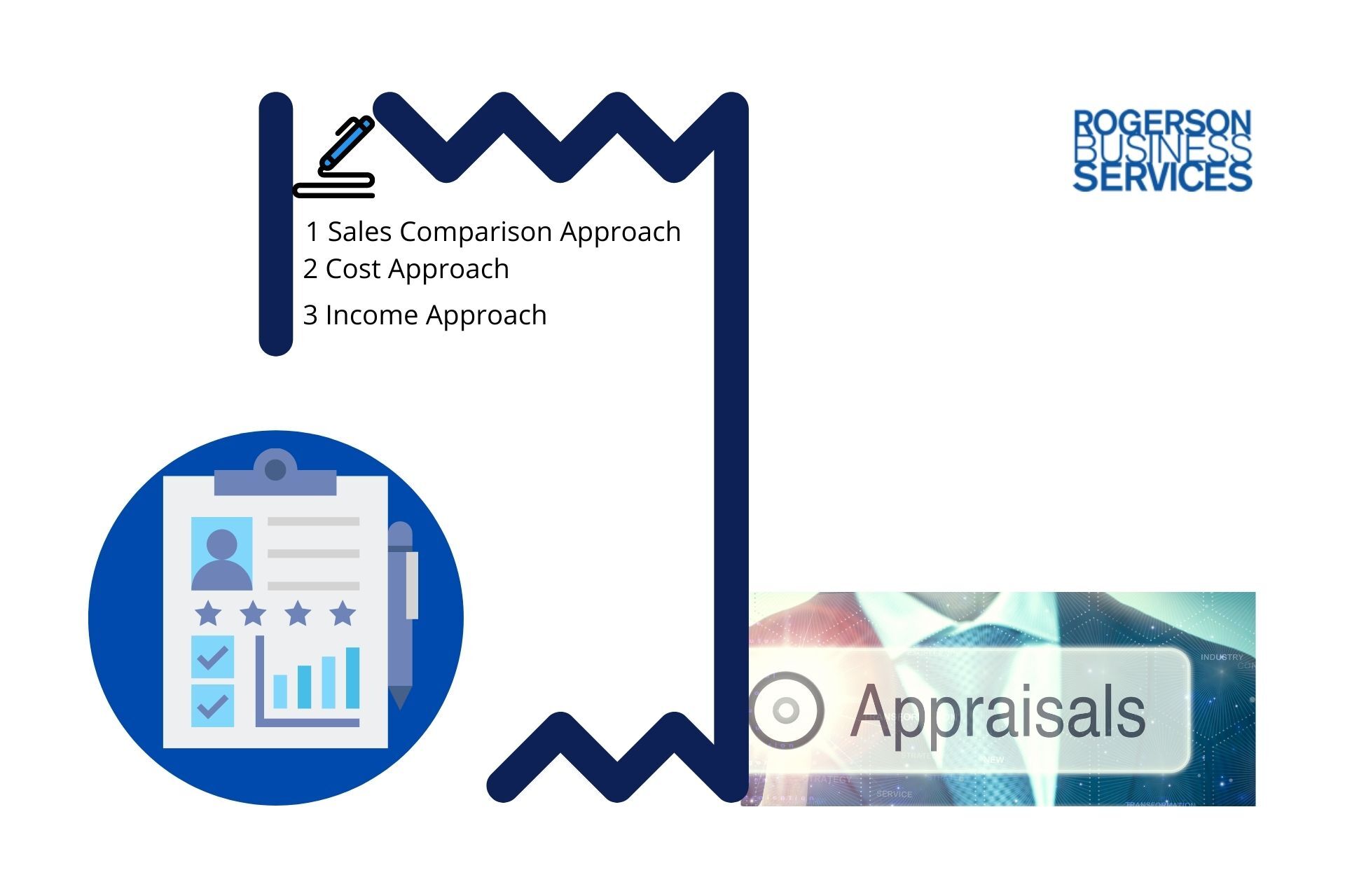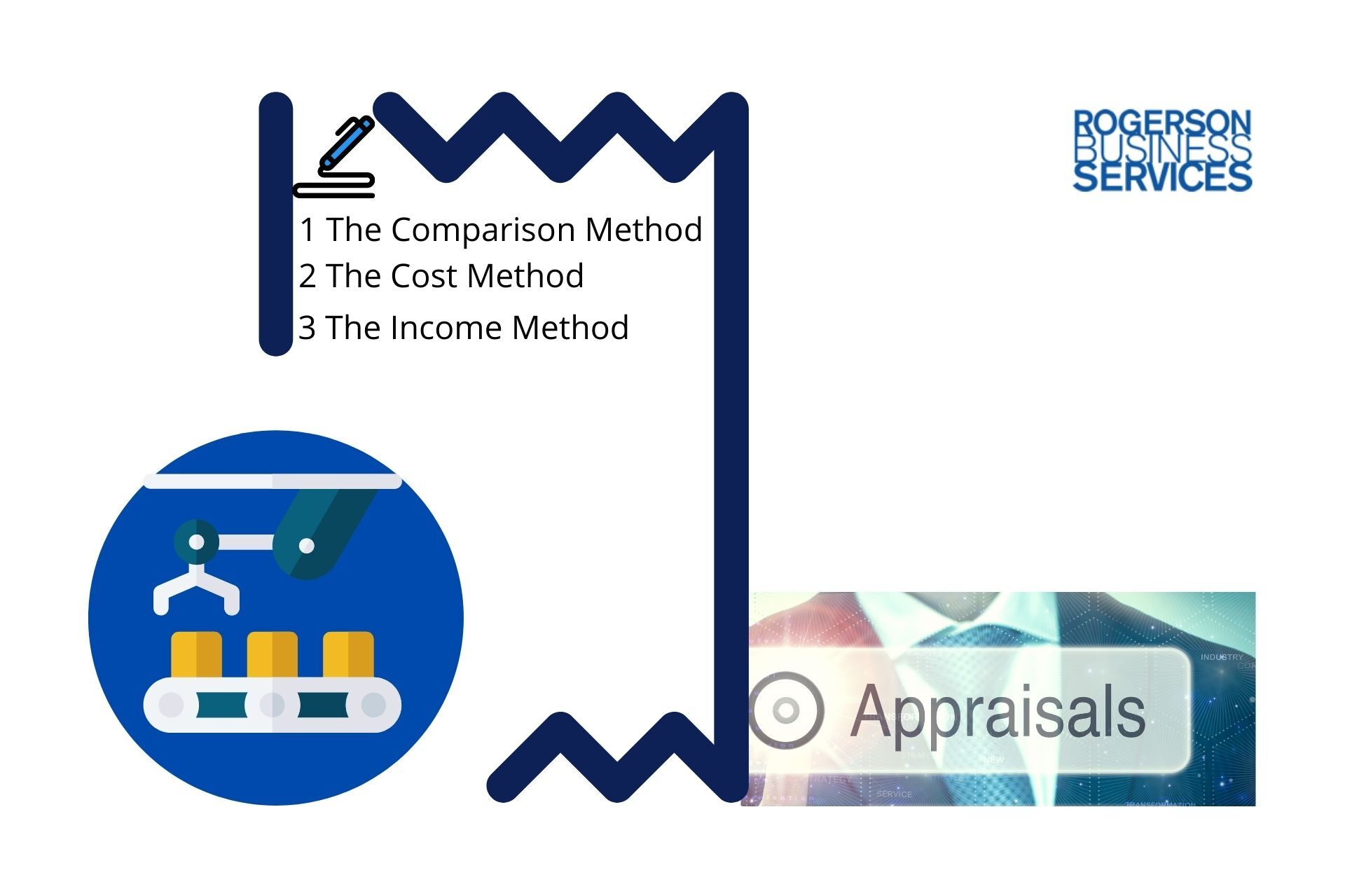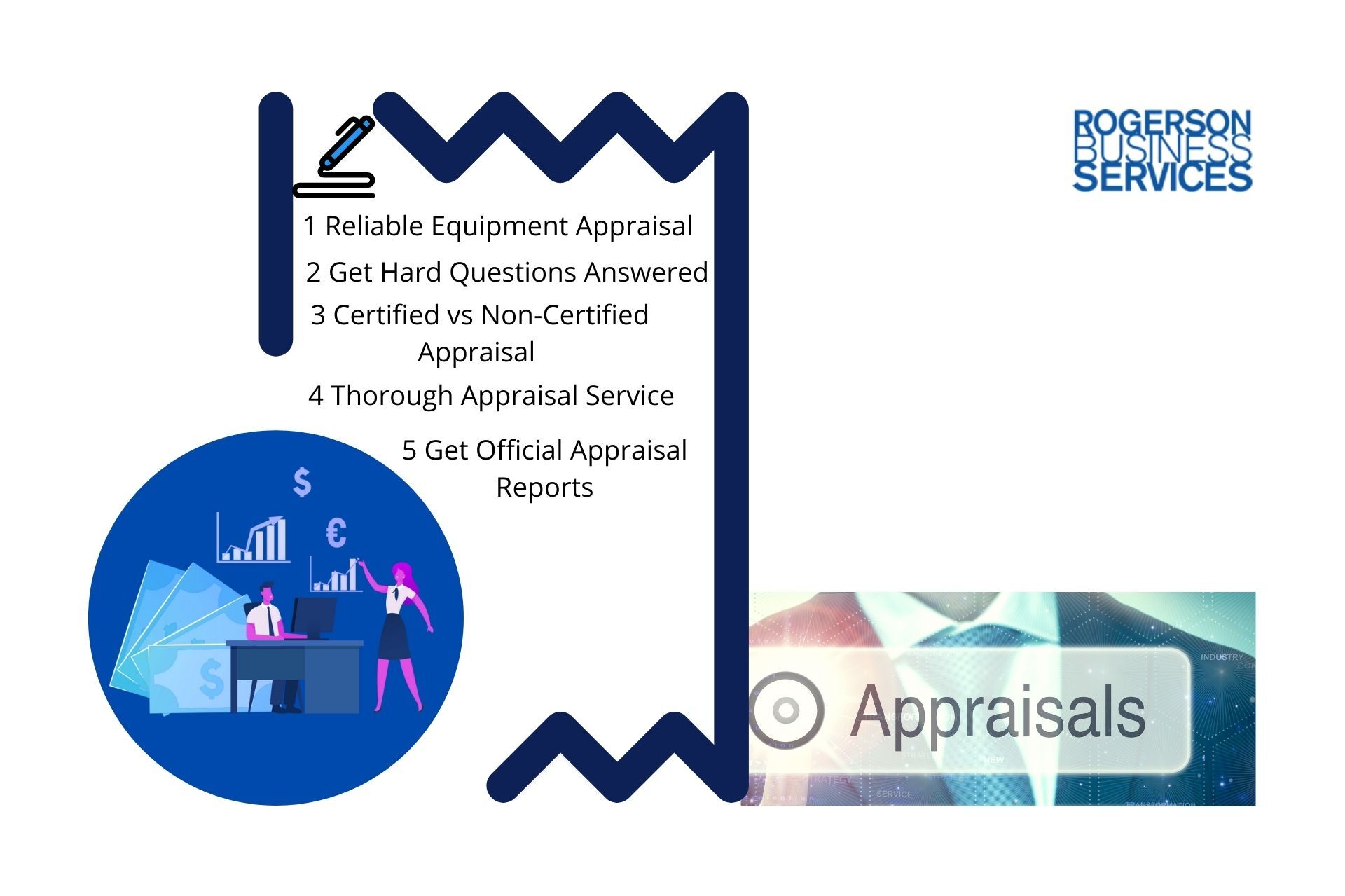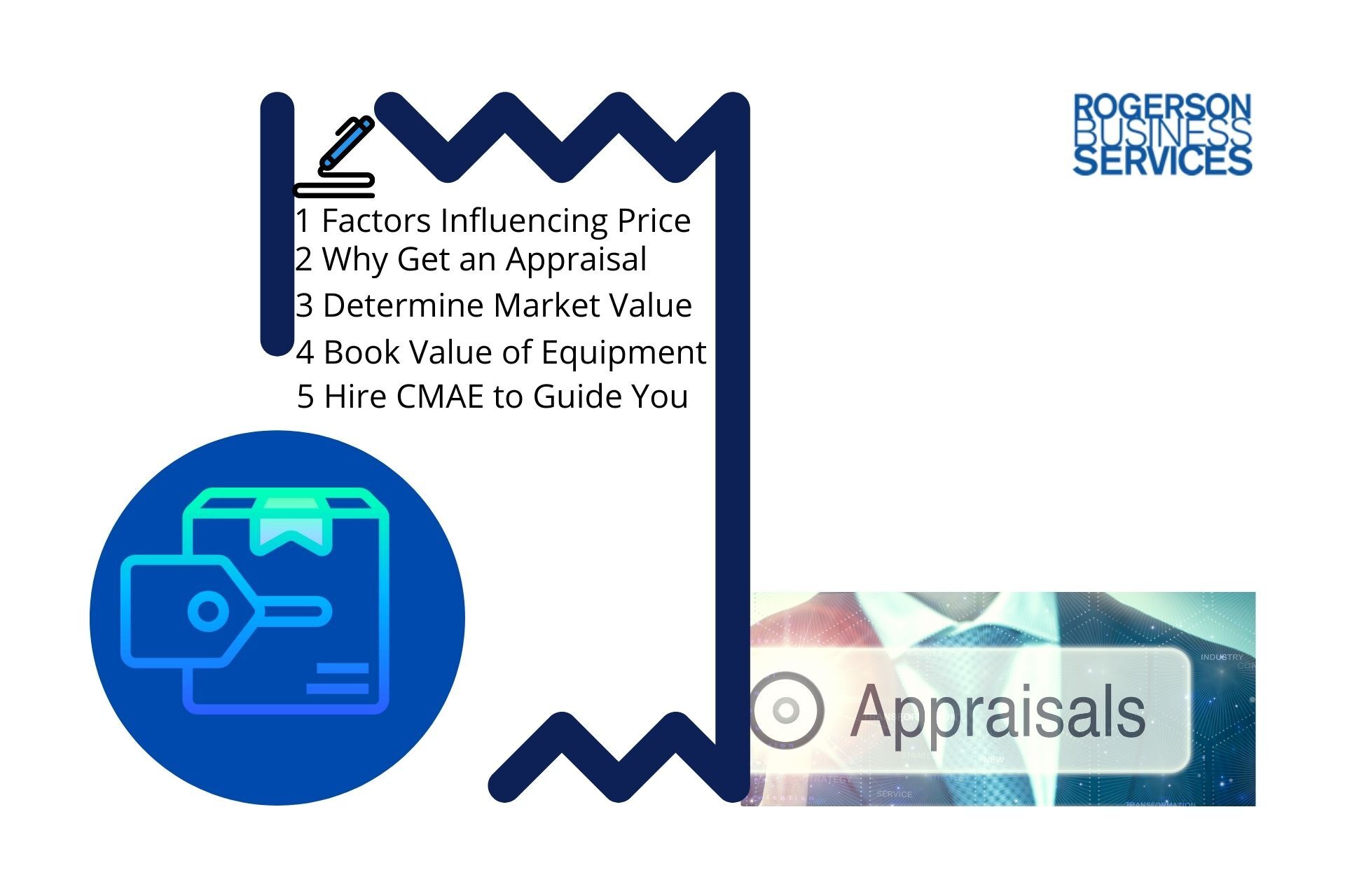Machinery Appraisal: How Do You Value Machinery?
Machinery Appraisal
- One: Understand What is Machinery Appraisal
- Two: Learn the Benefits of Conduction Machinery Appraisal For Your Business
- Three: Get Familiar With the Classification of Machinery Appraisal
- Four: What is a Desktop Appraisal Report
- Five: What is a Summary Appraisal Report
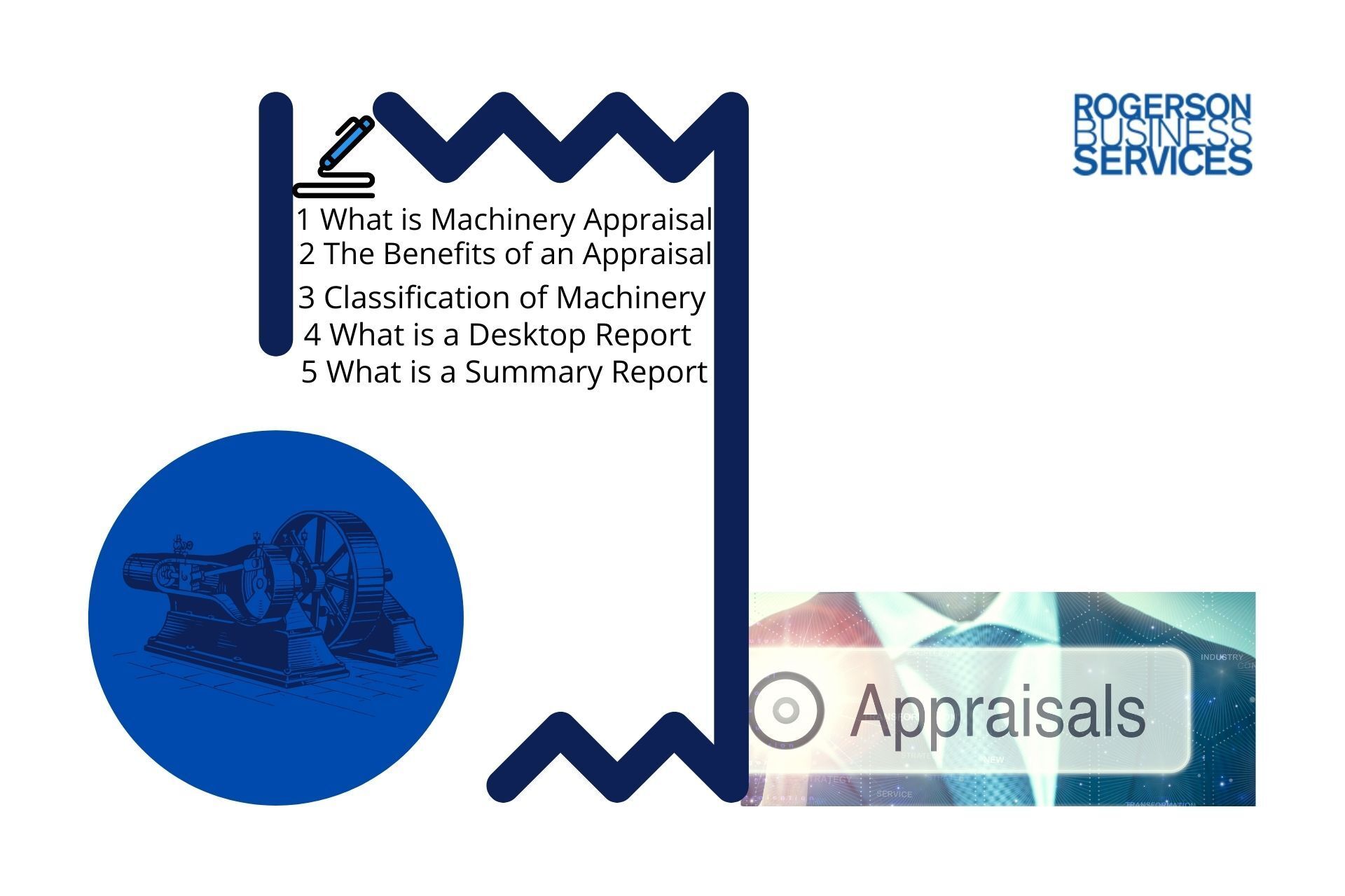
Need a better understanding of machinery appraisal and how it benefits businesses in California? Here’s what you need to know.
What is Machinery Appraisal?
Machinery appraisal is the act of determining the value of equipment owned by a business. This evaluation helps you budget for repairs and parts, choose when to sell equipment, and obtain a fair price for your company and assets should you sell.
There are different methods of evaluation, including:
Sales Comparison Method
A Certified Machinery and Equipment Evaluator may use the sales comparison method to evaluate used equipment. This method involves the comparison of price points for similar used equipment sold in California.
There are many factors involved in this process, such as age, quality, and lifespan of the equipment being evaluated. Compared to similar tools in your field, an appraiser will determine how your equipment stacks up. This is often a more beneficial assessment method than used equipment book values alone.
Income Method
As the name suggests, the income method of value comparison considers the residual income a piece of machinery may accrue over time. As equipment ages, it offers less ROI, but there’s still potential for equipment use or income during resale.
When determining how to value used equipment, an appraiser thinks about your machinery from every angle. If a piece of equipment is nearing the end of its lifespan, it is less valuable because it poses fewer years of service to your business. Knowing how much income machinery may provide a company deems its value.
Cost Method
Equipment that is difficult to appraise, such as unique or outdated items, may use the cost method approach. This considers the age and quality of a product, along with additional variables impacting utility and lifespan. Based on the original cost of the product, the appraisal is performed from residual value.
The appraiser considers how the cost should decrease with age based on changes to the equipment over time. This method is common if a used equipment guide evaluation isn’t available, or there are few items similar to this machine in your area to base local value on.
The professional valuation of machinery and equipment by an experienced appraiser uses a multifaceted approach. Compared to deducing this information on your own, you can rest assured an appraiser is providing an accurate and in-depth assessment. Working with a professional saves time and energy sourcing appraisal information.
Why Machinery Appraisal and Equipment Valuation is a Good Idea for Your Business
There are many reasons to conduct a machinery appraisal. Among American companies, there are three main benefits to consider. Here, we’ll consider how these reasons stack up in a specific industry situation. For a woodworking business, for example, the advantages of machinery appraisal include:
1. Insurance Purposes
Every business needs insurance, including coverage on machinery and equipment. The cost of your insurance is influenced by a variety of factors, such as the value of your equipment. When your machinery is evaluated by a certified machinery appraisal specialist, insurance brokers are more likely to take the new or used equipment appraisal at face value.
In woodworking, there are many factors to consider when insuring the property. These machines are intricate, and some are quite dangerous if not in perfect working order. Equipment book value alone won’t help in an insurance dispute. The word of a certified Machinery and Equipment Appraiser offers the best protection against financial risk due to equipment failure or damage.
2. Buying and Selling
Equipment appraisal services help you determine how much a company’s assets are worth before you buy or sell. Working with an equipment appraiser ensures you are paying or spending fairly as you engage in a deal to buy or sell machinery.
If you are selling a bandsaw, router table, or air filtration system, machinery appraisal services let you get top dollar. Sometimes equipment still has plenty of life left in it, regardless of age or previous usage. Earning back some of your original investment ensures you get your money’s worth and provides funding for new equipment.
3. Property Tax Assessments
If you’re not selling, you may still require an appraisal report to help you plan for future property taxes. You may be entitled to write-offs for equipment depreciation, which could save you during tax season. This is another great reason to work with professional machinery and equipment appraisers, to guarantee you’re getting a fair and accurate assessment.
As a business, your assets are included in the value of your company. As woodworking equipment such as scroll saws and oscillating spindle sanders deteriorate, they require upgrades, maintenance, and new parts. This is costly to your business and shouldn’t be counted as a full asset during tax assessment.
These are not the only reasons hiring an equipment appraiser is an asset to your company. It helps you prepare for future budgeting, records of condition and maintenance, and more.
Machinery Equipment Appraisal Classifications
When determining how to value equipment in California, the class system is used. This incorporates various elements of equipment appraisal to categorize your machine. It considers how old your tools are, how much work may be needed in the future, and whether it will run without additional maintenance.
Classes and classifications in appraisal reports for equipment are important. They establish a fair market value for a variety of uses. These values work for many equipment types and are used as other industry standards as well. You may see them on documents for property sales, as an example.
There are five classifications a certified equipment appraiser uses during an equipment appraisal, these are:
- Very Good (VG): Equipment with a VG classification is in excellent running order and won’t need repairs or replacement for some time. This is the highest classification denoting quality in used machinery. Equipment in the VG class is often easy to resell or insure.
- Good Condition (GC): Machinery which looks nearly new and requires no repairs but may have undergone repairs in the past qualifies as GC. GC may also be affected by performance or age. While not the best classification, it is still desirable by many businesses seeking affordable used equipment.
- Fair Condition (FC): If a piece of equipment is still operational but requires some maintenance to keep performing, qualifies as FC. This equipment may be aging or require a new part upon purchase. As far as classes go, this is the lowest class most buyers consider when pricing for any equipment they plan to reuse.
- Poor Condition (PC): Buying used machinery with a PC classification means you’re in for some major repairs. To use this equipment, you will be putting additional money into getting it running properly. A PC classification is better than simply tossing equipment out, however, as it leaves room for potential residual income.
- Scrap Condition (X): Inoperable equipment which cannot be repaired is considered class X. These machines may be used for parts but are otherwise scrap metal. This is the lowest classification equipment may receive and is generally undesirable.
These classifications help you learn the value and potential lifespan of your assets. They are especially helpful if you are buying or selling. They don’t offer a full picture of your equipment, however, which is why machinery appraisers are required to complete a full report.
Desktop Appraisal Summary in Machinery Appraisal
Sometimes an equipment appraisal form can’t be completed in person. If a physical inspection of used equipment isn’t possible, a machinery appraisal specialist will conduct a desktop appraisal summary. This is an evaluation without the physical assessment used during an official appraisal service.
During this process, a Certified Machinery and Equipment Appraiser base their decision on information gained through:
- Used equipment price guide
- Photos of the equipment
- Thorough description from the owner
- Questions by the appraiser answered by the owner
A desktop valuation of machinery includes an unbiased report by a professional appraiser. While the service is conducted online and over the phone, it is still accurate and may be used in an appraisal lawsuit, insurance dispute, or as a price guide during resale.
Following the initial investigation, further due diligence may be conducted by the appraiser. The desktop report is authorized for use in used machinery values because they meet industry standards for appraisal. They are also an affordable option for evaluation, saving time and travel expenses for both parties.
What is a Summary Appraisal Report, and Why is it Necessary?
A summary appraisal report defines the Scope of Work and process of evaluation. It is delivered to the business ordering the evaluation, from the appraiser.
A Scope of Work is a formally written document outlining the contractual agreement between two parties (business and appraiser). It discusses what is required of the appraiser, and results in a final report. It lists factors such as:
- Degree of asset inspection
- Factors impacting machinery value
- Research extent
- Type of analysis
- Inspection depth
- Intended user
- Intended use
- Machinery condition
- Property interest
Each piece of machinery, or equipment part being appraised, is included in the summary appraisal report. It also outlines definitions of fair market value, machinery and equipment, condition of equipment, method of evaluation, and additional considerations.
A business may require a summary appraisal report as ordered by a third party for legal or financial purposes. Some common governing bodies requiring a report include:
- CPA: During tax evaluation, your chartered accountant may request an equipment appraisal to determine company value.
- Government authority: If there is an issue with business tax filings, the government may request proof of machinery appraisal.
- Buyer: When selling your used machinery, a buyer is more inclined to purchase equipment that has been professionally appraised
- Lawyer: In an appraisal lawsuit, your lawyer, or the opposing lawyer, may require proof of equipment value.
This report is pivotal in understanding how an equipment valuation service is performed and what it tells you about your machinery. It includes pertinent information about your appraisals, such as your appraiser’s qualifications and certification.
Working with uncertified machinery appraisers could result in a negative outcome during a sale, legal disputes, or tax evaluations. A summary appraisal report ensures you have all the information you need to confirm the validity of an appraiser in a dispute.
Machinery Appraisal for Your Business
Overall, machinery equipment valuation is an asset to your company in many ways. It not only supports your claims of value during a sale or for further evaluation by governing authorities.
You can count on it during purchase negotiation while applying for funding, and to reassure shareholders.
For more information on machinery appraisal, we invite you to contact Rogerson Business Services at 1-844-414-9600 or use our online contact form.
If you have decided to appraise your used equipment and then sell your business now or within the next six months, click here to get started with this quick and simple form, so we can understand your pain points better and prioritize your inquiry with RBS Advisors.
Go to the next article: Part of a guide to help with appraising machinery and equipment in California series ->
More Tips to Help Value & Appraise Machinery and Used Equipment in California
Hey there! Can we send you a gift?
We just wanted to say hi and thanks for stopping by our little corner of the web. :) we'd love to offer you a cup of coffee/tea, but, alas, this is the Internet.
However, we think you'll love our email newsletter about building value and properly position your company before transition/exit your business ownership.
As a special welcome gift for subscribing, you'll also get our helping and educational guides, tips, tutorials, etc.. for free.
It's filled with the best practices for retiring serial business owners like Dan Gilbert, Larry Ellison, Warren Buffett, and many more.
Just sign up for our emails below.

